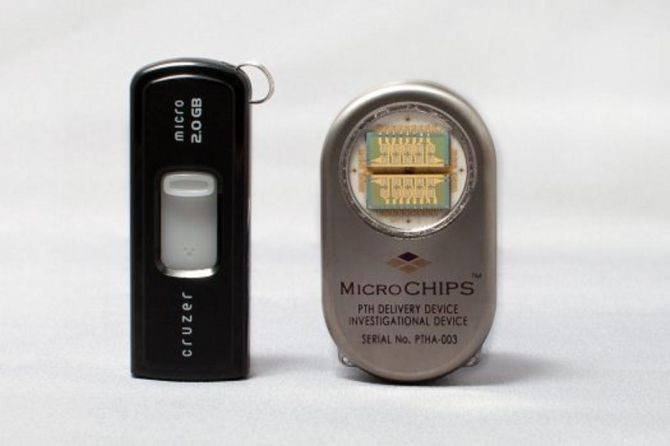Remote-Controlled Microchip Implant that Delivers Medicine Doses

A novel drug-delivery microchip implant that releases medication on command from a wireless remote control could improve treatment compliance and revolutionize healthcare by paving the way for a new era of “telemedicine” they defined as delivering health care over a distance, according to a news release on Thursday.
Researchers from the Massachusetts Institute of Technology said the results from the first human study of the programmable microchip, funded by MicroCHIPS Inc., was successful in administering daily doses of an osteoporosis drug that is traditionally received by injection on Thursday at the annual meeting of the American Association for the Advancement of Science.
“You could literally have a pharmacy on a chip,” said one of the chip’s developer Robert Langer, the David H. Koch Institute Professor at MIT. “You can do remote control delivery, you can do pulsatile drug delivery, and you can deliver multiple drugs.”
The promising results suggest that the technology could potentially be used to treat numerous conditions that require frequent or daily injections, according to study lead author Robert Farra, who is also the chief operating officer of MicroCHIPS Inc.
“Patients with chronic diseases, regular pain-management needs or other conditions that require frequent or daily injections could benefit from this technology,” Farra said in a statement.
The study was conducted in Denmark, and surgeons had implanted the microchips in the abdomens of seven women aged 65 to 70 in a 30-minute operation. Researchers then used the programmable implants to deliver an osteoporosis drug called teriparatide to the women.
The results showed that there were no adverse side effects, and that the devices, which deliver dosages from microscopic pools engraved in the chip for up to 20 days, were comparable to regular injections when investigators measured the drug’s effects in participant blood samples.
Researchers also said that the participants reported that they could not feel the devices and reported a preference for the implanted microchip to daily injections for future treatment.
The chips have programming capability so dosages can be either scheduled in advance or triggered remotely by radio communication. Although current versions only work over a distance of a few inches, researchers plan to lengthen that distance.
MicroCHIPS developers are also working on a microchip capable of delivering dosages for a year or longer.
Cima said that the technology can be useful for improving patient compliance, which is a big issue especially when patients have are in charge of their own daily drug injections.
Cima said that the microchip “avoids the compliance issue completely, and points to a future where you have fully automated drug regimens.”
The results were published in the Feb. 16 online edition of Science Translational Medicine.
A diagram of how the microchip works (Courtesy of MicroCHIPS Inc.)



























